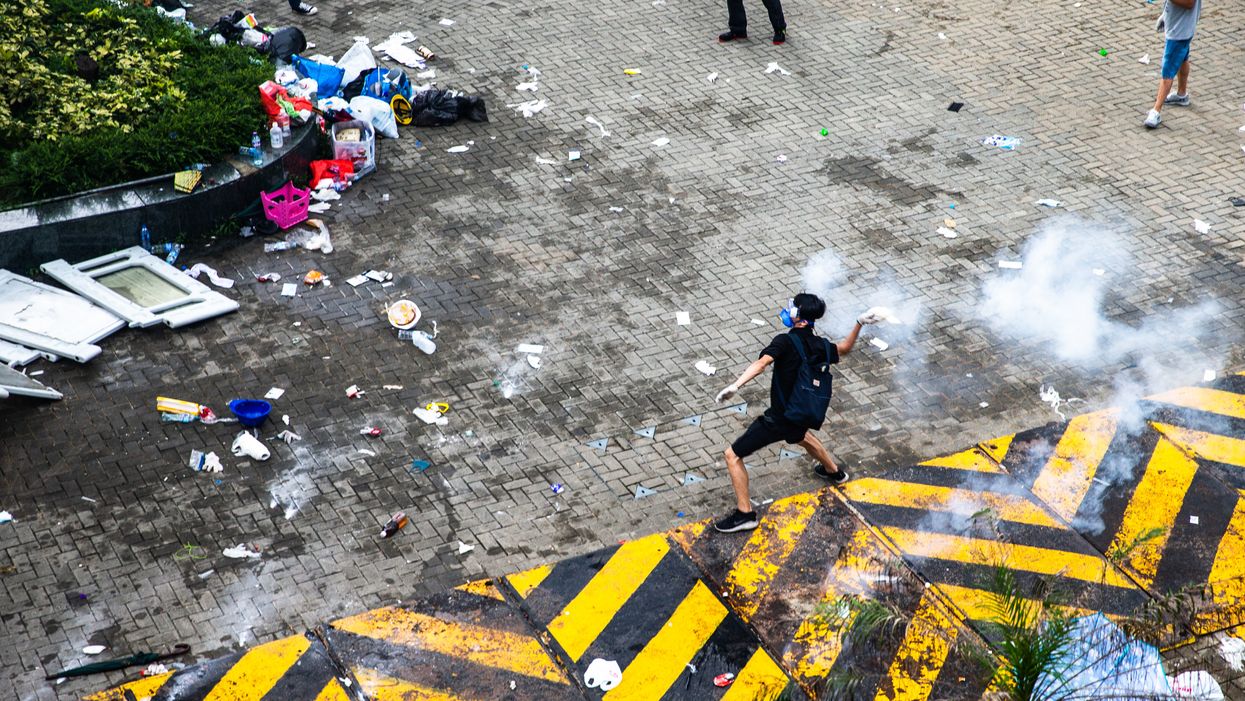
Sanjit Das/Bloomberg via Getty Images

Things are getting serious
Protesters again converged on Hong Kong's legislature Wednesday to protest a contentious extradition bill, and over the last several days, things have gotten ugly. Wednesday's protests came after more than a million demonstrators filled the streets Sunday to protest the bill.
Authorities ordered police to break up the protests with tear gas, rubber bullets, and water hoses.
CNN reported that the proposed bill would make it easier for the city to extradite fugitives from the law to mainland China and Taiwan by closing loopholes the currently prevent Chinese officials from taking fugitives and enemies of the government into custody.
In a lengthy statement on the bill, the government pointed to a Taiwan murder case in which a man allegedly killed his 20-year-old Hong Kong girlfriend while vacationing. Current Hong Kong laws prohibit the city from responding to Taiwan's requests to extradite the suspect.
A portion of the statement said: "The Taiwan murder case has clearly shown that serious crimes can happen in any place and at any time ... Hence, we have to plug the loopholes in the current mechanisms as quickly as possible." The government insisted that "all existing human rights and procedural safeguards provided for in the current legislation will be maintained under the case-based arrangements."
Opponents of the bill insist that there is no guarantee of a fair trial incorporated into the bill and do not wont Hong Kong citizens subjected to the Chinese justice system.
The protesters succeeded in delaying a debate on the bill. According to The Guardian, "the debate was called off and rescheduled 'to a later time to be determined' after protesters blocked streets near the legislative council's chamber."
You can read more about the bill here.
Those opposed to the bill say that it could impact activists, journalists, and foreign business owners who could easily be turned over to mainland China. The bill, they say, could also be used to target political enemies. The city has a separate legal and political system from mainland China.
Those voicing opposition to the bill include the Hong Kong Bar Association, the American Chamber of Commerce, and the Hong Kong Journalists Association.
A statement from the Hong Kong Journalists Association said that the bill "will not only threaten the safety of journalists, but also have a chilling effect on the freedom of expression in Hong Kong."
"This sword hanging over journalists will muzzle both the journalists and the whistleblowers, bringing an end to the limited freedom of speech that Hong Kong still enjoys," the statement added.
According to another report by CNN, "Critics say the bill will leave anyone on Hong Kong soil vulnerable to being grabbed by the Chinese authorities for political reasons or inadvertent business offenses and undermine the city's semi-autonomous legal system."
HK Lau, a demonstrator and retired civil servant, told the Hong Kong Free Press that the bill's passage would mean that the city's "One Country, Two Systems" principle would be squashed.
Several Hong Kong judges told Reuters that the bill "deeply disturbed" them.
Some residents of Hong Kong are particularly concerned over the bill because the city has enjoyed autonomy since the British left in the late 1990s and has no formal extradition treaty with mainland China. Al Jazeera reported that a lot of residents fear that the bill will "erode freedom in the semi-autonomous territory."
Britain handed over Hong Kong, which was a British colony until 1997, under the notion of "one country, two systems," which permitted the city to operate under political and legal autonomy.
"Critics fear the bill will undermine the independence of Hong Kong's legal system and put Hong Kong citizens and foreign nationals at risk by allowing suspects to be sent to mainland China for trial," the report added.
The bill would permit mainland China to exercise even more control over Hong Kong and could force the city to hand over dissidents. The bill would likely also permit mainland China to exercise more political power over Hong Kong's leadership.
Many residents — specifically younger residents — see Carrie Lam, chief executive of Hong Kong, as a puppet of the Chinese government. In 2017, Lam insisted that she was "no puppet of Beijing."
On Sunday, a throng of more than a million protesters gathered at central Hong Kong's Victoria Park, where some chanted, "Hong Kong, never give up!" while others changed "Step down" and "Shelve the evil law!"
Other people demanded that Lam step down. After demonstrations, however, Lam seemed more committed to the bill's passage than ever before, insisting that it would help to improve the current legal system. Lam appears to be determined to pass the bill into law.
Police were forced to use pepper spray on some masked demonstrators who later threatened to occupy a main city road.
The protests and demonstrations turned violent overnight, and authorities were forced to clear the streets of people with batons.
On Wednesday, police deployed tear gas on gathered protesters, and also used pepper spray, rubber bullets, bean-bag rounds, and batons to fend off demonstrators.
Earlier, police armed themselves with rifles and riot gear against the demonstrators.
Yahoo reported that some of the protesters even pulled up loose bricks and began throwing them.